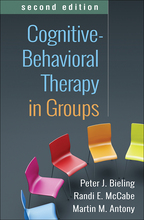Cognitive-Behavioral Therapy in Groups
Second Edition
Peter J. Bieling, Randi E. McCabe, and Martin M. Antony
HardcoverPaperbacke-bookprint + e-book
Hardcover
orderSeptember 5, 2022
ISBN 9781462549870
Price: $86.00 466 Pages
Size: 6⅛" x 9¼"
Paperback
orderSeptember 13, 2022
ISBN 9781462549849
Price: $57.00 466 Pages
Size: 6⅛" x 9¼"
e-book
orderJuly 7, 2022
PDF and Accessible ePub ?
Price: $57.00 466 Pages
ePub is Global Certified Accessible
print + e-book $114.00 $68.40
orderPaperback + e-Book (PDF and Accessible ePub) ?
Price: 466 Pages
ePub is Global Certified Accessible
“This is the book I would have liked to have been able to read when I started running CBT groups….A very valuable resource for professionals setting up and running CBT groups for a wide range of clients, as well as for professionals supervising CBT groups.”

—Cognitive Behavioral Therapy Book Reviews (on the first edition)
“Group CBT is similarly effective to individual CBT, but is more cost-effective and allows for more clients to be treated in a given period of time. Unfortunately, most evidence-based CBT protocols are developed for individual delivery, with only superficial instructions for how to deliver in groups. Bieling, McCabe, and Antony offer a much-needed corrective, expertly explaining how to set up and manage CBT groups for a range of presenting problems and disorders. A 'must have' for any clinician.”

—Peter J. Norton, PhD, School of Psychology, Counseling and Psychotherapy, Cairnmillar Institute, Melbourne, Australia
“The majority of clinicians are still trained in doing CBT with individuals only, making this broad-ranging, comprehensive guide essential reading. The second edition has been revised throughout to include updates from the literature and to achieve the explicit aim of making the book more user friendly. Significant revisions reflect the latest advances in our understanding of the nature and treatment of psychological disorders, such as the merger of the various anxiety disorders into a single chapter, the incorporation of 'third-wave' approaches, and the chapter on transdiagnostic treatment in acute inpatient settings. This state-of-the-art book should be read by any clinician or student who wants to integrate CBT techniques with group process factors.”

—Simon A. Rego, PsyD, ABPP, Chief of Psychology, Montefiore Medical Center, Bronx, New York; Department of Psychiatry and Behavioral Sciences, Albert Einstein College of Medicine
—Cognitive Behavioral Therapy Book Reviews (on the first edition)
“Group CBT is similarly effective to individual CBT, but is more cost-effective and allows for more clients to be treated in a given period of time. Unfortunately, most evidence-based CBT protocols are developed for individual delivery, with only superficial instructions for how to deliver in groups. Bieling, McCabe, and Antony offer a much-needed corrective, expertly explaining how to set up and manage CBT groups for a range of presenting problems and disorders. A 'must have' for any clinician.”
—Peter J. Norton, PhD, School of Psychology, Counseling and Psychotherapy, Cairnmillar Institute, Melbourne, Australia
“The majority of clinicians are still trained in doing CBT with individuals only, making this broad-ranging, comprehensive guide essential reading. The second edition has been revised throughout to include updates from the literature and to achieve the explicit aim of making the book more user friendly. Significant revisions reflect the latest advances in our understanding of the nature and treatment of psychological disorders, such as the merger of the various anxiety disorders into a single chapter, the incorporation of 'third-wave' approaches, and the chapter on transdiagnostic treatment in acute inpatient settings. This state-of-the-art book should be read by any clinician or student who wants to integrate CBT techniques with group process factors.”
—Simon A. Rego, PsyD, ABPP, Chief of Psychology, Montefiore Medical Center, Bronx, New York; Department of Psychiatry and Behavioral Sciences, Albert Einstein College of Medicine



